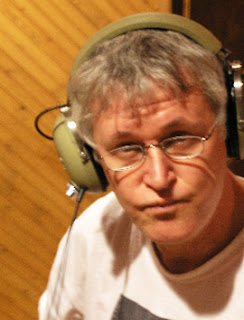As an underground indie performer, he was always very capable at carving out the short-run pop-rock songs that skip along so fast that it isn't always easy to settle in on a few standouts. In that regard, almost nothing had changed.
Pollard plunks down 17 tracks, with some ideas sparking less than a minute of music. Amazingly enough, none of those minutes are boring and it's all over in about a half hour.
Honey Locust Honky Tonk is an odd assemblage of indiscriminately listenable indie rock numbers.
Even when Pollard plays for the shortest length of the time, there is something big behind behind the eyebrows. He is a songwriting powerhouse, convincing in half as many notes as other musicians.
After a few listens, especially if you are familiar with the work, you will start to hear some formula to it. But the thing I like best about Pollard is he always manages to mix in equal parts newness too. And these songs, the ones cut for Honey Locust Honky Tonk, are among my favorite tracks of all time.
 The album opens with He Requested Things, an airy pop-rock song that turns eerie as the boy who arrives on the world begins to request things. The lyrics and hooks will linger long after, leaving feelings that create unease as much as comfort. It isn't clear whether the boy was lifted up or shot down for his audacity to want something better. What is clear is you somehow benefited.
The album opens with He Requested Things, an airy pop-rock song that turns eerie as the boy who arrives on the world begins to request things. The lyrics and hooks will linger long after, leaving feelings that create unease as much as comfort. It isn't clear whether the boy was lifted up or shot down for his audacity to want something better. What is clear is you somehow benefited.The theme of it isn't exactly surrendered in Circus Green Machine either, which also shows his unwavering reverence to Pete Townshend. It won't be the last time such influences are heard on the album, but it stands out as the most obvious here. Expect them to creep in elsewhere.
There really isn't any point in purchasing singles. The value is downloading the album. If you are thinking about picking one or two, sample the entire album. Many great tracks on Honey Locust Honky Tonk are loaded up on the end.
I Killed A Man Who Looks Like You begs to be played over and over, with its haunting revelations. In the early verses, he distances himself from the victim. By the final verses, he reverses the idea entirely.
The fact that the song feels long is part of the magic of Pollard. Another must-have track is Airs. If there was ever a song that makes you want to take off more than you put on, this is the song that will do it. There is a wise and humbled authenticity to the lyrics that rolls along like he just knows, despite the imperfections and occasional vocal crack.
Other standout songs include the bigness of Real Fun Is No One's Monopoly, the lyrics in It Disappears In The Least Likely Hands, and the Brit bounciness of She Hides In Black. Who Buries The Undertaker is equally good, as is Strange And Pretty Day.
The latter is all about the lo-fi piano before it introduces Suit Minus The Middle. It's also a fine reminder that Pollard is as much a professor of music as he is anything else. Some of those hooks and harmonies conjure up other musicians but in ways that are uniquely his own.
Honey Locust Honky Tonk Pollardizes 7.9 On The Liquid Hip Richter Scale.
As much music as Pollard has been able to produce in the last two years alone is something of a standout. In addition to this big album, he put out the memorable English Little League under Guided By Voices. The best track off that album, for those who are curious, was Island (She Talks In Rainbows). Noble Insect is close. What makes his solo work different is how starkly haunted he can be.
You can turn up Honey Locust Honky Tonk by Robert Pollard on Amazon. You can download the album from iTunes. Barnes & Noble has also listed the vinyl edition of the album. The added warmth will no doubt make the album hum. Pollard doesn't tour, but occasionally makes guest appearances at events like Riot Fest with Guided By Voices.
![Liquid [Hip]](https://blogger.googleusercontent.com/img/b/R29vZ2xl/AVvXsEjAFBQPqS7J0-rrttNoRYSsuwIePPZf4Nq6sqDioK1zzVQXJIQXKzq_NVNI4n6h3inuRQFBKOcJeZeSufkdHHIOxbSWyBjTjTxgKEQGyPzdwvkEEeECh4bI5YEGk4RWGUINSd7vulPQsCA/s1600-r/liquidhip.jpg)
